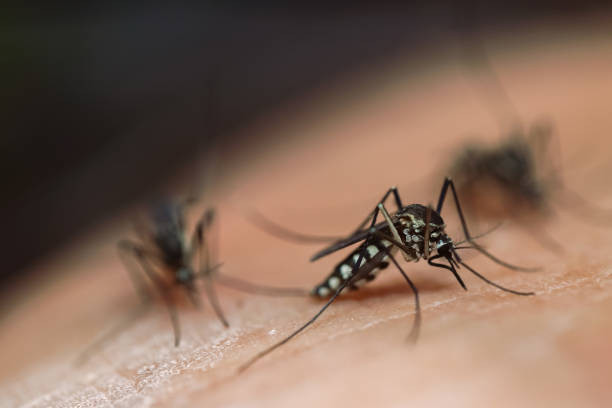Mosquitoes in July pose a significant nuisance and health risk in warm, humid conditions. Homeowners and businesses must understand what attracts these pests during mid-summer and learn effective methods for repelling them and preventing breeding. This article reviews the factors that attract mosquitoes in July, lists effective repellents and prevention methods, and highlights professional control services to maintain a safe, mosquito-free environment.
What Are the Main Factors That Attract Mosquitoes in July?
Mosquitoes are drawn to signs of a food source and ideal breeding conditions. In July, high temperatures, elevated humidity, and ample standing water combine with human and animal CO2 emissions, body odors, and even dark clothing to create a magnet for these pests. Understanding these factors is essential for effective prevention.
How Does Standing Water Increase Mosquito Attraction?
Standing water is a key attractant because it provides ready-made breeding sites. Mosquitoes lay eggs in stagnant pools, puddles, and containers. Without prompt drainage and regular inspection of potential water accumulations like clogged gutters or plant saucers, mosquito populations can quickly expand under ideal seasonal conditions.
Why Does Carbon Dioxide Draw Mosquitoes in Summer?
Mosquitoes have a heightened sensitivity to carbon dioxide exhaled by humans and animals. In summer, increased activity levels amplify CO2 output, making outdoor gatherings especially attractive targets. Reducing exposure time and using repellents can help lessen the risk of bites, particularly in crowded or high-activity areas.
How Do Body Odor and Heat Influence Mosquito Behavior?
The warm body heat and related chemical signals—such as lactic acid, ammonia, and fatty acids from sweat—act as strong attractants for mosquitoes. Individuals who emit higher levels of these cues are more likely to get bitten. Using scent-neutralizing products and cooling measures can offer some protection during peak mosquito activity.
What Role Do Dark Colors Play in Mosquito Attraction?
Dark clothing absorbs more heat, increasing a person’s body heat signature and making them more visible to mosquitoes. In July’s high temperatures, choosing light-colored garments can help reduce the number of bites by lowering the contrast between the body and the cooler environment.
Which Mosquito Species Are Most Active in July?
A variety of species thrive in July, including Aedes, Culex, and Anopheles. Aedes mosquitoes are especially active and known for transmitting diseases like dengue and Zika, while Culex species, common in urban settings, are associated with West Nile virus. Recognizing the locally dominant species can guide the choice of prevention and control measures.
What Are the Most Effective Mosquito Repellents to Use in July?
Effective repellents provide both immediate relief and long-term protection by preventing mosquitoes from landing and biting. They are a critical part of any integrated mosquito control plan during midsummer.
How Do DEET and Picaridin Compare as Mosquito Repellents?
DEET and Picaridin are among the most trusted repellents on the market. DEET works by interfering with mosquito receptors, offering protection for hours, while Picaridin provides similar benefits without a greasy feel. Both ingredients can reduce bite incidents by over 90% when used correctly, making them ideal for high-risk environments.
Can Essential Oils Like Citronella Repel Mosquitoes Effectively?
Citronella and other essential oils offer a natural alternative though their effects are generally shorter in duration compared to synthetic products. They work by masking the scents that attract mosquitoes. For outdoor areas or direct skin application during July evenings, products with higher concentrations or combinations of oils have been shown to provide effective, though temporary, protection.
How Do Mosquito Traps Work to Reduce Mosquito Populations?
Mosquito traps attract insects using carbon dioxide, heat, and light, then capture or kill them. These traps can help interrupt the mosquito reproduction cycle, reducing overall population density. When integrated with other control measures, a well-placed trap may reduce local mosquito numbers significantly during the season.
What Are the Benefits of Using Eco-Friendly Mosquito Repellents?
Eco-friendly repellents use natural ingredients such as essential oils and plant extracts that are biodegradable and less harmful to non-target species. They reduce chemical exposure risks—particularly important for children, pets, and sensitive individuals—while still offering meaningful protection against mosquitoes. Their use contributes to a healthier ecosystem and aligns with sustainable practices in pest management.
How Can You Prevent Mosquito Breeding and Reduce Attractants Around Your Property?
Limiting mosquito breeding is a key strategy in controlling infestations. Understanding their lifecycle and habitats allows property owners to take proactive steps to reduce attractants and interrupt the breeding cycle.
Why Is Removing Standing Water Crucial for Mosquito Control?
Eliminating standing water removes the primary breeding ground for mosquitoes. Regularly emptying containers, cleaning gutters, and ensuring proper drainage can dramatically lower mosquito numbers by preventing larvae from maturing. Implementing these measures can reduce mosquito populations by disrupting their life cycle.
What DIY Mosquito Control Tips Are Most Effective in July?
DIY approaches such as diligent yard maintenance, trimming vegetation, and filling low areas where water gathers are effective during peak summer months. Installing fans on porches or decks can create air currents that mosquitoes find difficult to navigate. Additionally, homemade repellents using essential oils like lemon eucalyptus can provide supplementary protection when used in tandem with other methods such as light traps at dusk.
How Does Habitat Modification Help in Long-Term Mosquito Control?
Habitat modification includes landscaping practices that reduce water pooling and discourage mosquito breeding. Techniques such as grading, using drought-resistant plants, and installing proper irrigation systems create an environment less favorable for mosquitoes. Over time, these modifications not only enhance property aesthetics but also contribute to a sustained reduction in mosquito populations.
What Professional Mosquito Control Services Are Available in July?
When DIY measures are insufficient, professional mosquito control services offer advanced solutions tailored to property-specific needs. Their systematic approach combines both chemical and non-chemical methods to achieve long-lasting suppression of mosquito populations.
How Do Mosquito Misting Systems Work to Control Mosquitoes?
Mosquito misting systems remotely disperse insecticides over outdoor areas at scheduled times, typically during peak evening hours. This uniform application quickly reduces adult mosquito populations and is ideal for both home and commercial settings where continuous control is needed.
What Are Larvicides and How Are They Used in Mosquito Control?
Larvicides target mosquito larvae in standing water before they can mature. Applied to ponds, ditches, and gutters, these specialized agents disrupt the mosquito life cycle, significantly lowering the number of biting adults. Regular larvicide treatments are a proven method to effectively manage outbreaks.
How Does EcoGuard Pest Solutions Customize Mosquito Control Plans?
Companies like EcoGuard Pest Solutions assess individual properties based on factors such as yard size, water-prone areas, and local mosquito activity. They then design a customized plan that may combine misting systems, larvicides, and eco-friendly repellents, ensuring a tailored and cost-effective solution.
What Are the Advantages of Eco-Friendly Mosquito Control Services?
Eco-friendly services minimize chemical use and its associated risks by employing biodegradable ingredients and sustainable practices. These methods help protect non-target species and reduce environmental pollution, while still delivering effective mosquito suppression around sensitive areas such as water bodies and landscaped gardens.
What Are the Common Mosquito-Borne Diseases to Be Aware of in July?
Mosquito-borne diseases are a significant public health threat during the summer months. Public awareness and preventive measures are essential to reducing the spread of infections transmitted by these insects.
How Does West Nile Virus Spread Through Mosquitoes?
West Nile Virus is primarily spread through the bite of an infected mosquito that has fed on an infected bird. Routine mosquito control measures, including consistent repellent use and environmental management, can help lower the risk of virus transmission in areas where the disease is prevalent.
What Are the Symptoms and Risks of Zika Virus?
Zika virus, transmitted by Aedes mosquitoes, may cause mild flu-like symptoms but poses severe risks for pregnant women, potentially leading to congenital birth defects such as microcephaly. Effective personal protection and community-wide control measures are critical in areas with active transmission.
How Can Mosquito Control Reduce the Risk of Disease Transmission?
By lowering mosquito populations through source reduction, misting systems, and repellent application, communities can decrease the number of vector-host interactions. This integrated approach is key to reducing the incidence of mosquito-borne diseases during peak summer months.
How Can You Identify Mosquito Activity and Behavior in July?
Monitoring mosquito activity helps in timing interventions effectively. Understanding their lifecycle stages and feeding habits is crucial for both home and commercial pest management.
What Is the Mosquito Life Cycle and Why Does It Matter in July?
Mosquitoes progress through four stages: egg, larva, pupa, and adult. Warm July temperatures can shorten the cycle to 7–10 days, meaning even small amounts of standing water can lead to rapid population increases. Identifying each stage aids in targeted control efforts and timely treatments.
How Do Mosquito Feeding and Breeding Behaviors Change in Summer?
Mosquitoes are more active in feeding during warmer periods, especially at dusk and dawn, while their breeding intensifies in the presence of standing water. Recognizing these patterns allows for the strategic use of repellents and scheduling of control measures.
Which Mosquito Species Are Most Common in Residential and Commercial Areas?
Aedes and Culex species are typically found in both residential and urban settings. Aedes mosquitoes tend to bite during the day, whereas Culex are more active at night. Understanding these differences assists in selecting appropriate repellents and designing effective control strategies.
What Are the Best Practices for Combining DIY and Professional Mosquito Control?
A combined approach using both DIY methods and professional services yields the best results in mosquito management. While DIY techniques can offer immediate relief, professional support ensures long-term control.
When Should You Consider Professional Mosquito Control Services?
Professional services become necessary when DIY efforts fail to reduce persistent or severe infestations. Experts can identify hidden breeding sites and deploy targeted treatments, leading to faster and more efficient mosquito reduction.
How Can Homeowners and Businesses Work Together to Reduce Mosquito Populations?
Cooperative efforts, including synchronized treatments and community clean-up programs, enhance the effectiveness of mosquito control. Sharing best practices between neighbors, businesses, and local governments contributes to a safer and less mosquito-prone environment.
What Seasonal Maintenance Plans Help Keep Mosquitoes Away Year-Round?
Long-term strategies involve regular cleaning of gutters, scheduled larvicide applications during spring and early summer, and periodic professional treatments during peak mosquito seasons. Consistent maintenance and use of automated systems, such as misting devices, help maintain low mosquito densities throughout the year.
Frequently Asked Questions
Q: What factors most influence mosquito attraction in July?
A: Factors include standing water, elevated CO2 levels, body heat, dark clothing, and the prevalence of species like Aedes and Culex.
Q: Are eco-friendly repellents as effective as chemical ones?
A: Yes, when used with proper application and environmental management, though their protection period may be shorter.
Q: How often should standing water be removed?
A: At least once a week during peak seasons to reduce breeding opportunities.
Q: Can professional mosquito control services guarantee a mosquito-free property?
A: They significantly reduce mosquito numbers, but ongoing maintenance is necessary for lasting control.
Q: What immediate steps can be taken to reduce mosquito breeding?
A: Draining standing water, applying larvicides, and using personal repellents are effective immediate measures.
Conclusion
Effective mosquito control in July requires both immediate protection and long-term prevention strategies. By understanding key attractants such as standing water, CO2 emissions, body heat, and dark clothing, and by combining DIY methods with professional services, property owners can develop a comprehensive management plan. This integrated approach not only provides timely relief but also significantly lowers the risk of mosquito-borne diseases.




